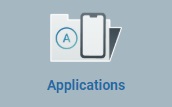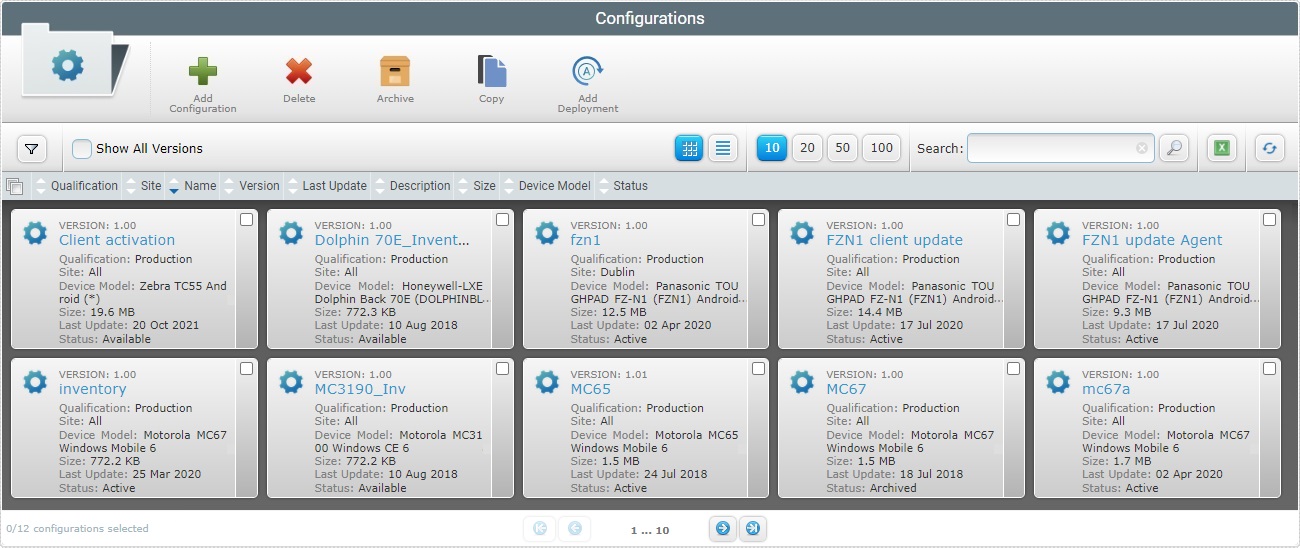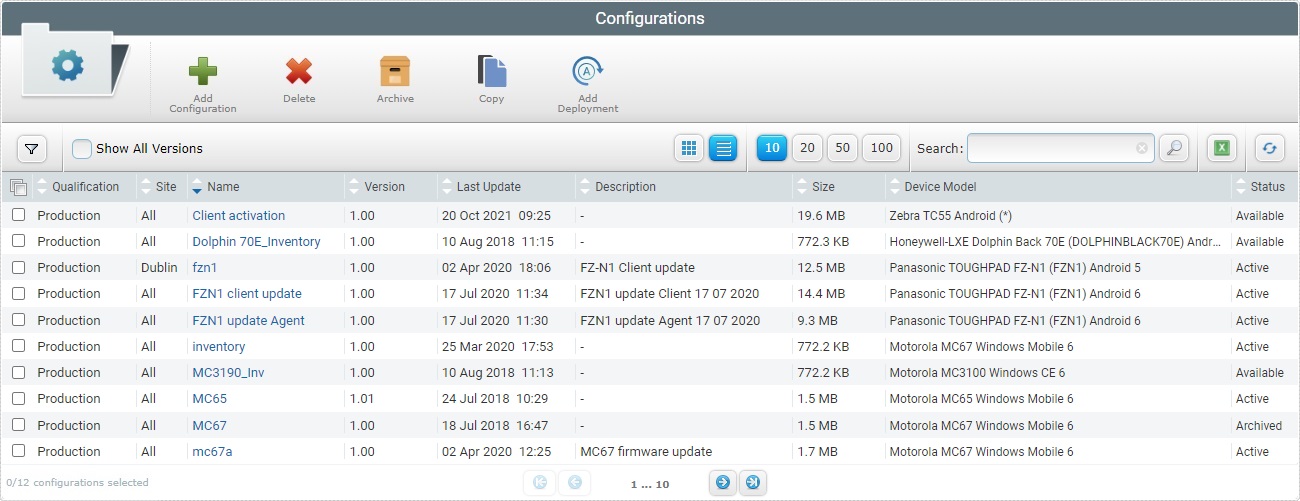Configurations
Overview
A Configuration is a container that can include applications and/or MCL firmware and/or other files created for a specific device type and, later on, deployed to a device group. For more detailed information about deployments, see Deployments.
Configurations created at site level are restricted to that site. Configurations created at account level can be available to every site in the account or target a specific site, in which case, they become available in the target site and can be viewed in its "Configurations" page.
To access the "Configurations" sub-module, click  , in the "Control Panel" section, and, in the resulting row, select
, in the "Control Panel" section, and, in the resulting row, select  .
.

The image below illustrates the page that is accessed when clicking  .
.
This page displays all configurations created in every site within the account.
Information regarding configurations can be displayed in a grid or a list view. By default, applications are displayed in a grid view but the view can be changed.
Click ![]() or
or ![]() to select the most appropriate view:
to select the most appropriate view:
•Click ![]() for a grid view:
for a grid view:

This view displays the following information:
Version |
The configuration's version number. |
(Displayed in light blue) |
The configuration's name. Click it to access the corresponding "Configuration Details" page. See Configuration Details. |
Qualification |
The configuration's qualification. See Qualification. There are 4 qualifications available:
•"Production" - for configurations that are used in the customer's working environment, for day-to-day tasks. •"Acceptance" - for configurations to be applied to sites/included device groups with an "Acceptance" qualification for specific testing purposes. •"Test" - for configurations that contain application/resources that will be used for general tests. •"Development" - for configurations to be used in a development environment. |
Site |
The name of the site the configuration version is restricted to. If the configuration version is NOT restricted, it shows "All". |
Device Model |
The configuration's target device: manufacturer, device model and Operating System. |
Size |
The configuration package's size. |
Last Update |
The date of the configuration's last update. |
Status |
The configuration's status: "Available", "Active" or "Archived". |
Description |
Information added in the "Description" field of the "Properties" tab in the "Configuration Details" page is created. |
OR
•Click ![]() for a list view:
for a list view:

This view displays the following information:
Qualification |
The configuration's qualification. See Qualification. There are 4 qualifications available:
•"Production" - for configurations that are used in the customer's working environment, for day-to-day tasks. •"Acceptance" - for configurations to be applied to sites/included device groups with an "Acceptance" qualification for specific testing purposes. •"Test" - for configurations that contain application/resources that will be used for general tests. •"Development" - for configurations to be used in a development environment. |
Site |
The configuration's site. If a configuration's version is restricted to a site, the site's name is displayed, if not "All" is displayed. |
Name (displayed in light blue) |
The configuration's name. Click the name to access the corresponding "Configuration Details" page. See Configuration Details. |
Version |
The configuration's version number. |
Last Update |
The date of the last configuration update. |
Description |
The configuration's information added in the "Description" field of the "Properties" tab in the "Configuration Details" page. |
Size |
The size of the configuration package. |
Device Model |
The configuration's target device: manufacturer, device model and Operating System. If no device target is defined "-" is displayed. |
Status |
The current status of the configuration: "Available", "Active" or "Archived". |
The "Configurations" page also offers the following options:

•![]() Click this button to access the "Qualification", "Status", "Manufacturer/Model" and "Last Update". filters. Use them to limit the configuration's list:
Click this button to access the "Qualification", "Status", "Manufacturer/Model" and "Last Update". filters. Use them to limit the configuration's list:
I. Select the intended data from the drop-down. You can use as many filters, simultaneously, as necessary.
II. Click ![]() to filter the list according to the data you selected in the "Qualification", "Status", "Manufacturer/Model" and/or "Last Update" drop-downs.
to filter the list according to the data you selected in the "Qualification", "Status", "Manufacturer/Model" and/or "Last Update" drop-downs.
III. Click ![]() to empty all the filters simultaneously OR select the "All" option in the corresponding drop-down.
to empty all the filters simultaneously OR select the "All" option in the corresponding drop-down.
•![]() Check this option to view all application versions and not just the latest version.
Check this option to view all application versions and not just the latest version.
•![]() Define how many items are displayed at a time by selecting one of the available options (10 items per page/20 items per page/50 items per page/100 items per page).
Define how many items are displayed at a time by selecting one of the available options (10 items per page/20 items per page/50 items per page/100 items per page).
•![]() Use the search box to look for listed configuration versions:
Use the search box to look for listed configuration versions:
a. Enter the name of the configuration you want to search for.
b. Click ![]() or press <ENTER> in your PC keyboard to initiate the search.
or press <ENTER> in your PC keyboard to initiate the search.
c. Use one of the following to clean the searched data to start a new search or return to a full view:
•empty the search box and click ![]() ;
;
•empty the search box and press <ENTER> in your PC keyboard;
•click the ![]() icon.
icon.
•![]() Click this button to refresh the page's information.
Click this button to refresh the page's information.
•![]() Use the buttons, included in this bar, to organize the listed items of the corresponding column:
Use the buttons, included in this bar, to organize the listed items of the corresponding column:
•![]() by ascending order.
by ascending order.
•![]() by descending order.
by descending order.
•![]() Click this button to select the listed items on display. In this case, the configurations.
Click this button to select the listed items on display. In this case, the configurations.
•Click the configuration's name (displayed in light blue) to access a page with the details of a particular configuration. See Configuration Details.
•![]() Use these buttons, located in the page's footer, to navigate the listed applications:
Use these buttons, located in the page's footer, to navigate the listed applications:
•![]() These buttons allow you to navigate between the next/previous grouped items per page.
These buttons allow you to navigate between the next/previous grouped items per page.
•![]() These buttons are used to navigate to the first/last grouped items per page.
These buttons are used to navigate to the first/last grouped items per page.
The "Configurations" page also provides direct access to specific operations:
To add a new configuration, use the ![]() button. For more information, see Creating a Configuration.
button. For more information, see Creating a Configuration.
To delete a configuration, use the ![]() button. For more information, see Deleting a Configuration.
button. For more information, see Deleting a Configuration.
To archive a configuration, use the ![]() button. For more information, see Archiving a Configuration.
button. For more information, see Archiving a Configuration.
To copy a configuration, use the ![]() button. For more information, see Copying a Configuration.
button. For more information, see Copying a Configuration.
To deploy a configuration, use the ![]() button. For more information, see Deploying a Configuration.
button. For more information, see Deploying a Configuration.
This chapter includes all the aspects associated to configurations (configuration details, the creating, editing and deleting of a configuration, etc.). The table below refers the user profiles that have access to the described operations:
![]()
Keep in mind that the account administrator and/or the site manager, at a lower level, can restrict other users' access rights. This user guide is presenting all the possibilities in terms of access.
Topic/Operation |
Description |
|---|---|
View the details of the configurations available to the site. |
|
Create a configuration to be deployed to specific device groups within the site. |
|
Edit configurations created within your own site that have NOT been deployed/have a deployment scheduled - editing a configuration that is already in use will generate an incremented version of that configuration. It is NOT possible to edit a configuration created at account level. |
|
Copy shared configurations and/or configurations created within the site. |
|
Archive configurations created within your own site - if a configuration is no longer needed, it should be archived. Configurations created at account level cannot be archived at site level. |
|
Schedule a specific configuration to be deployed at the intended date/time for the intended device group within the site |
|
Delete configurations that have NOT been associated to deployments. |